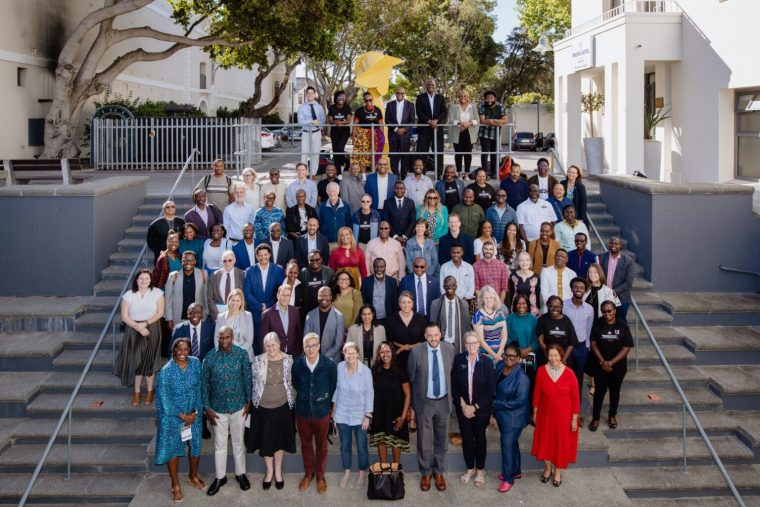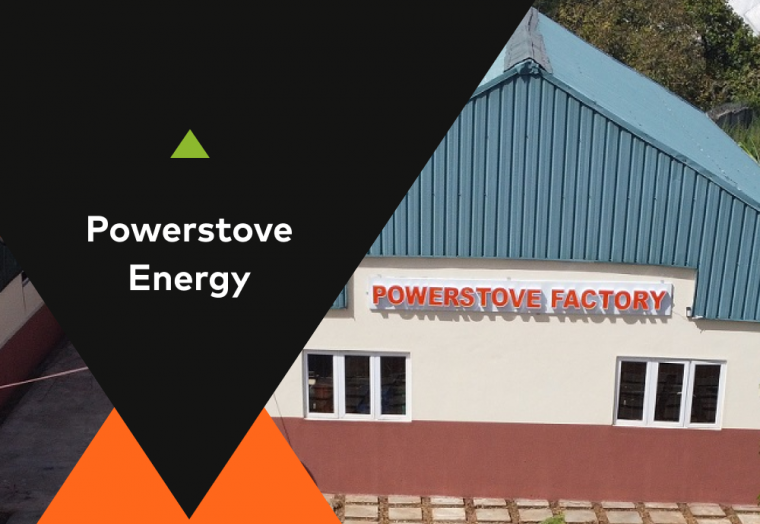Founders: Okey Esse and Glory Esse
The Africa Higher Education Health Collaborative, in partnership with the Mastercard Foundation, will be welcoming the Health Entrepreneurship (HENT) African Impact Challenge’s second cohort for their upcoming visit to Toronto, where they will continue their implementation phase through activities targeting business development, expanding entrepreneurial networks, and facilitating exposure to potential investors.
The University of Toronto’s Health Collaborative Internal Communications Working Group caught up with the ventures to learn more about the origins of their companies, what they’ve learned to date, and what is coming up next…
Powerstove Energy
Okey Esse and Glory Esse were inspired to create Powerstove Energy by their mom, who was a successful local food vendor. For 21 years, she cooked with firewood to support her business but was later diagnosed of a heart condition caused by constant inhaling of toxic smokes from the firewood. Her death inspired the two co-founders to build Powerstove Energy and carry on her legacy of successful entrepreneurial experiences.
In Nigeria, where approximately 83 million people endure the harsh realities of extreme poverty and food insecurity, the reliance on conventional fuels like charcoal, firewood, and kerosene exacts a heavy toll. The National Bureau of Statistics paints a stark picture: households devote over a quarter of their income to these energy sources, often at great peril to their health. The insidious effects of household air pollution claim the lives of 100,000 Nigerians annually, disproportionately impacting women and children.
Powerstove designs and manufactures smart smoke-free cookstoves that also self-generate electricity for users to charge their mobile phones and power home appliances using proprietary renewable bio-pellets as fuel. These sustainable, mosquito repellent bio-pellets are produced from post-harvest crops and wood waste. Powerstove uses 70% less cooking fuel when compared with other unsustainable fuelwood sources and is five times faster than traditional stoves. Powerstove users have been shown to save around $300 annually from cooking with the sustainable and renewable fuels. Unlike other cookstoves, it also provides access to free electricity which helps families in last mile communities, or emergency situations, to save hugely on energy costs by upwards of 83%. The Powerstove team is committed to fostering meaningful partnerships with their waste-suppliers, with a focus on households headed by women. They do this, in part, by providing both cash payments and health insurance to all women waste suppliers and their families.
What is the accomplishment to date that your team is most proud of?
“Powerstove has reached 2,671,900 livelihoods by selling 500,000+ units of Powerstove generating 28,000 kwh of clean electricity per day per household, generated an aggregate savings for households of approximately US$143 million yearly (that adds up to US$300 per year for a household – that is money in their pocket, not spent on toxic wood fuels). Nigeria produces 10 million tons of wood waste from local sawmills and wood industries, with no proper waste management system. Powerstove collects and upcycle the sawdust, turning it into sustainable and clean bio-pellets, reducing GHG emissions by 60,192 mtCo2 annually and saving over 4,000,000 trees.”
If you could give advice to another founder getting started, what would that be?
“Take risks, listen to your heart and be the most hardworking staff of your company.”
Looking ahead, the team is looking to continue fostering sustainable growth by introducing Powerstove Kits (PKs), a do-it-yourself, ready-to-assemble version of the Powerstove. This innovation will facilitate the export of the product, further assisted by their ability to flatpack ship the product. The team will in turn provide training to local partners for assembling with minimal resources. PKs address challenges related to high freight costs and duties, which will assist in keeping pricing competitive. They also hope their innovation can generate local employment in host countries, and to scale the number of women waste-suppliers to 3,000 by 2025.

You can learn more about Powerstove Energy
More News & Events
Skip scroller content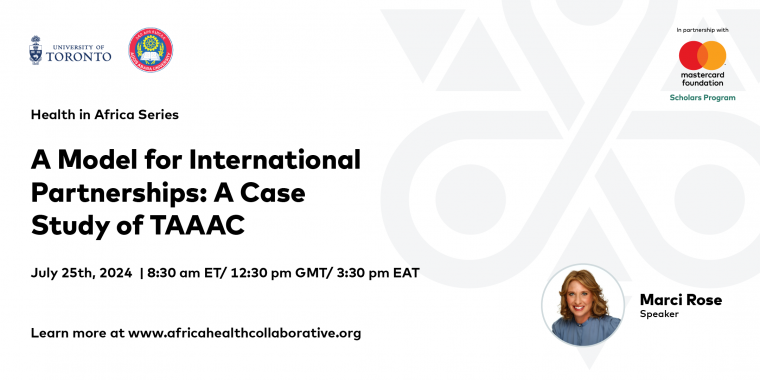
A Model for International Partnerships: A Case Study of TAAAC
The University of Toronto and Addis Ababa University are pleased to invite you to the next episode of the Health in Africa series discussing A Model for International Partnerships.
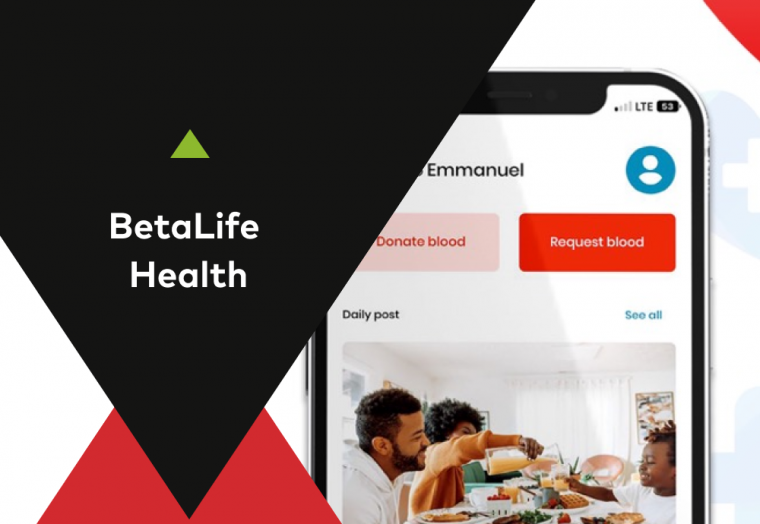
Venture Spotlight: BetaLife Health
BetaLife Health uses artificial intelligence (AI) to revolutionize blood supply management across Africa. Their platform uses predictive analytics to optimize blood inventory levels, distribution logistics and donor engagement, thereby improving the timeliness and availability of blood for transfusions.

Venture Spotlight: Remedius Mobile Health
Remedius Mobile Health aims to combat the identified problems by leveraging telemedicine through the Remedius Live platform. They seek to provide fast virtual appointment scheduling with doctors and specialists at affordable rates of about five dollars and provide comprehensive care to chronically ill patients. This is executed through an integral network of facilities that provide physical care to these patients if need arises.

Venture Spotlight: SnooCODERED
SnooCODERED aims to solve the problem of inadequate healthcare infrastructure (systems, facilities and human resources) in Africa. It is doing this by providing a suite of cost-effective mobile healthcare logistics applications that democratize access to the ambulance or first aid response, facilitate the delivery of medical supplies to diverse populations, and improve contact tracing and epidemiological modelling.
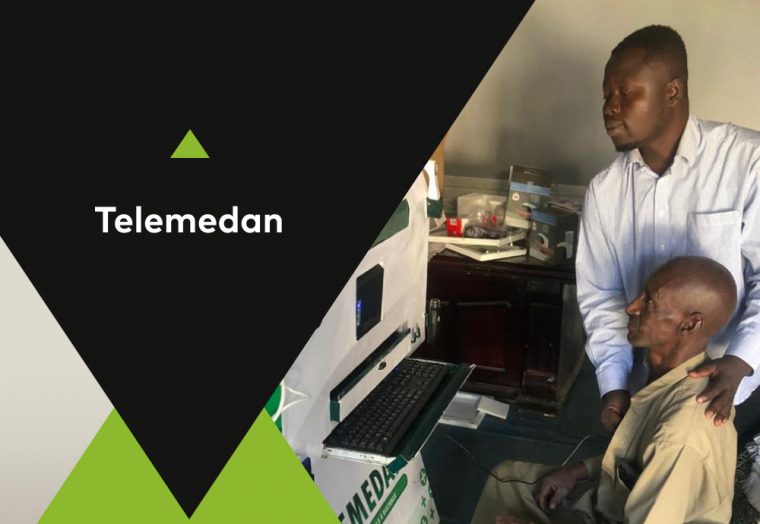
Venture Spotlight: Telemedan
Telemedan creates telemedicine kiosks in underserved communities in order to move toward closing the healthcare accessibility gap. Their kiosks facilitate video conferences between patient and doctor. They are equipped with medical devices for taking vital signs, such as ECG analysis, temperature measurement and blood oxygen saturation. Further, they feature stethoscopes, dermascopes, an HD camera and a scanner for the easy sharing of documents and lab results. With a focus on ease-of-access, Telemedan’s kiosks are user-friendly and accessible to those of varying levels of technology literacy.

Venture Spotlight: BuriCare Limited
BuriCare Limited has launched their Kangacare baby carriers, designed to address the critical need for newborn care, especially in regions lacking adequate neonatal facilities. With only four Neonatal Intensive Care Units available in their country, Kangaroo Mother Care emerged as a cost-effective solution, promoting vital skin-to-skin contact between mother and newborn to regulate body temperature. These locally knitted carriers are equipped with essential sensors capable of monitoring the baby’s temperature, pulse rate, and oxygen saturation. In the event of any abnormalities, an alarm alerts the mother to seek immediate assistance.
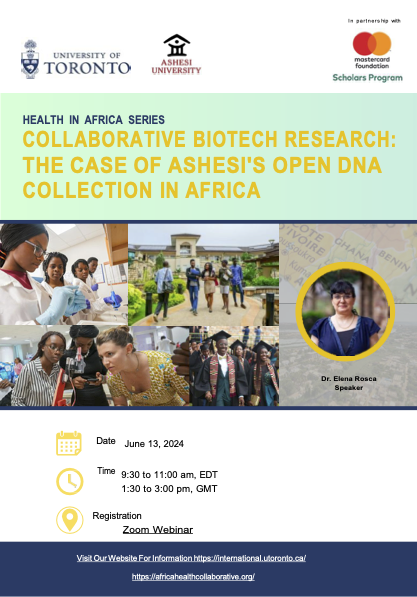
Collaborative Biotech Research: The Case of Ashesi’s Open DNA Collection in Africa
The University of Toronto and Ashesi University are pleased to invite you to the next episode of the Health in Africa series discussing Collaborative Biotech Research: The Case of Ashesi’s Open DNA in Africa.

Venture Spotlight: A-Lite Vein Locator
The A-Lite Vein Locator is a medical device that facilitates the non-invasive detection of veins under the skin. Using the A-Lite Vein Locator shortens cannulation time by up to 88.5 seconds and lowers the risk of needle-stick injuries and infections. Further, the use of the A-Lite Vein Locator has been shown to decrease medical waste and unnecessary use of clinic resources.

Venture Spotlight: Vas MedTech
Vas MedTech offers FlexiGyn, a portable, user-guided, and minimally invasive diagnostic camera that can operate in less specialized settings. This innovation is not only cost-effective, but also enhances accessibility. FlexiGyn enables community primary healthcare providers, such as nurses and general practitioners, to perform initial screenings and seamlessly consult with gynecologists for further diagnosis and referrals. FlexiGyn aims to make comprehensive women’s health care more accessible and convenient than ever before, thus addressing a global disparity in women’s health services.

Venture Spotlight: HealthEdu Ltd.
HealthEdu aims to confront the pressing need for a unified, easily accessible platform catering to the educational needs of healthcare professionals. HealthEdu creates a supportive community wherein practitioners, health organizations, and academic institutions converge to exchange insights, glean best practices, and collectively elevate standards of care.
